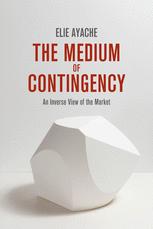

Most ebook files are in PDF format, so you can easily read them using various software such as Foxit Reader or directly on the Google Chrome browser.
Some ebook files are released by publishers in other formats such as .awz, .mobi, .epub, .fb2, etc. You may need to install specific software to read these formats on mobile/PC, such as Calibre.
Please read the tutorial at this link: https://ebookbell.com/faq
We offer FREE conversion to the popular formats you request; however, this may take some time. Therefore, right after payment, please email us, and we will try to provide the service as quickly as possible.
For some exceptional file formats or broken links (if any), please refrain from opening any disputes. Instead, email us first, and we will try to assist within a maximum of 6 hours.
EbookBell Team

0.0
0 reviewsIn The Medium of Contingency Elie Ayache builds upon his ground-breaking book The Blank Swan, in exploring the intersection of philosophy and finance, introducing new notions of price and market. Inverting the received view, he now sees a creation of matter in both the market and its metaphysics, rather than pure speculation.
Once recognized as the proper medium of contingency and disassociated from the probabilistic and statistical tools traditionally used to model it, the market can be thought as 'real', in a new sense of reality corresponding to the new sense of matter. To bring this new and original perspective, The Medium of Contingency builds on probability theory as first formalized by von Mises and Kolmogorov, and later revisited by Shafer and Vovk. It utilises the author's extensive experience in derivatives pricing technology and software, as well as his work in the philosophy of contingency and contingent claims, to propose a new philosophical interpretation of Brownian motion and of the Black-Scholes-Merton formula. Then it completes the overturning of the traditional view of the market by arguing that there should be no difference, ultimately, between an underlying asset and the derivative written on it.
This book does not aim to change the market but the way we must think of it. It is the author's conviction that there can be no philosophy of the market, and consequently no thinking of it, without a philosophy of contingent claims and of derivative pricing. The book provides the missing piece, which the philosophy of probability cannot provide alone. Its scope, however, extends beyond the strict critique of financial mathematics, as it also, and perhaps most importantly, delivers the author's definitive treatment of the philosophically prominent and recently much discussed notion of contingency.